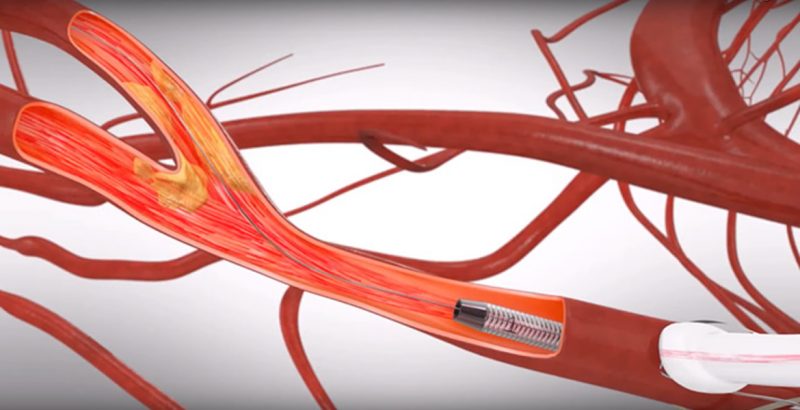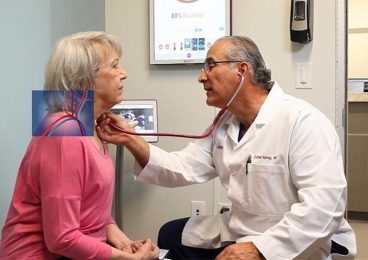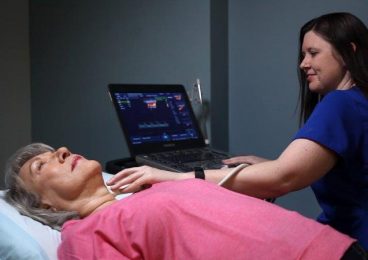For more information please visit our Educational Videos page.
TCAR Procedure
What is Transcarotid Artery Revascularization (TCAR)?
For patients with carotid artery disease who are at risk for traditional open surgery, a less-invasive, clinically proven alternative called TCAR is available.
The TCAR procedure is performed through a small incision at your neckline just above your clavicle. This incision is much smaller than a typical CEA incision. The surgeon will place a tube directly into your carotid artery and connect it to a system that will temporarily direct blood flow away from your brain, to protect against dangerous debris from reaching your brain during the procedure.
Your blood will flow through the system and any material will be captured in a filter outside the body. Your filter blood will then be returned through a second tube in your upper thigh. A carotid stent will be implanted to stabilize the plaque and prevent future strokes. After the stent is placed successfully, flow reversal is turned off and blood flow resumes in its normal direction.
TCAR has demonstrated the lowest stroke rate in clinical studies to date.
Am I eligible for transcarotid artery revascularization?
TCAR is a good choice for those patients who are considered high risk for traditional surgery due to age, anatomic issues, and other medical conditions. Ultimately, based on your medical history and workup, your vascular physician will determine if you are a good candidate for TCAR.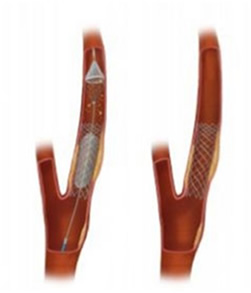
Treatment options for carotid artery disease depend upon the severity of the overall patient condition and symptoms. Moderate disease may not require an interventional procedure. More severe blockages may require treatment with open surgery, called carotid endarterectomy, or an endovascular procedure in which a carotid stent is implanted to stabilize the plaque to prevent a future stroke. You should be screened for carotid artery disease if you have:
- Weakness, numbness, tingling or paralysis of the arm, leg, or face on one side of your body
- Trouble swallowing
- Loss of eyesight or blurry eyesight in one eye
- Dizziness, confusion, fainting, or coma
- Unexplained slurred or garbled speech
Sometimes, patients are screened for carotid artery disease if the doctor knows the patient has vascular disease elsewhere in the body. Blockages can also be found when your physician hears a sound through a stethoscope placed on the neck. The sound is caused by blood flowing past the blockage.
Am I at risk for complications during the TCAR procedure?
TCAR has been studied extensively and is an FDA-cleared procedure. Over 2,500 procedures have been done worldwide and the clinical data have been excellent. In fact, the data have been so compelling that the Society of Vascular Surgeons, CMS, and the FDA all came together in September 2016 to create a program in order to support its reimbursement.
What happens during the TCAR procedure?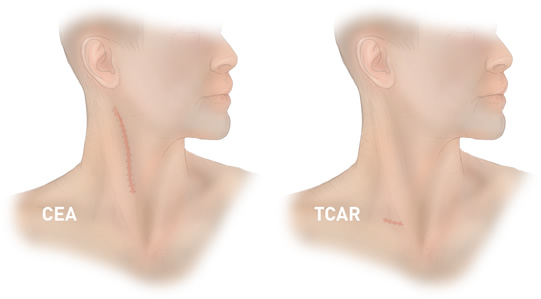
A small incision is made at the base of the neck, just above the collarbone. A puncture is made into the carotid artery and a small tube is placed inside the artery. This gets connected to the system that will temporarily direct blood flow away from the brain. The blood is filtered and then returned to a vein through a second tube placed in the upper thigh. While the brain is protected during this temporary flow reversal, a stent is placed in the carotid artery to stabilize the plaque and prevent future stroke. The blood flow is then returned to normal and the system is removed.
The entire procedure usually takes only about an hour. Patients can be either asleep or awake during the TCAR Procedure and patients are typically held overnight for observation.
Are there any complications?
This procedure is proven safer than open surgery for carotid artery disease because there are few complications, namely the risk of stroke is extremely small. Some patients worry if there is ever a problem that occurs with the blood being diverted away from the brain. Surprisingly, it’s rarely a problem because the brain has redundant arteries that supply it with blood. In addition, the critical part of the procedure, when the blood flow is reversed, only lasts about 10 minutes, so it’s over very quickly.
Who came up with this procedure?
A couple of vascular surgeons by the name of Dr. David Chang and Dr. Enrique Criado actually came up with the idea separately, but around the same time in 2004. A company based out in California, called Silk Road Medical, has worked over the past 10+ years with the vascular surgery community in refining the procedure, conducting clinical trials, and are now commercializing TCAR in the US.
WATCH OUR VIDEOS
Dr. Boulos Toursarkissian Explains TCAR
https://youtu.be/ETXNZuh-9kc
Dr. Grady Alsabrook Explains TCAR
https://youtu.be/3LiuJgB_8z8
Dr. Jeffrey Stein Explains TCAR
https://youtu.be/0DvIJM_JBoE
Dr. Milad Mohammadi Explains TCAR
https://youtu.be/Nx7jLXXNNBw

